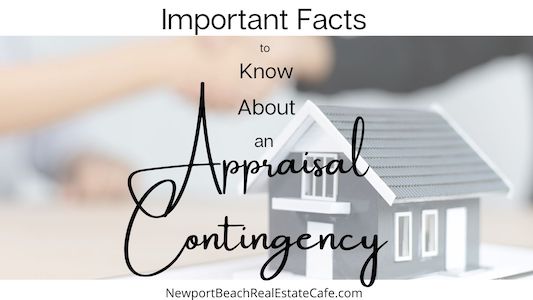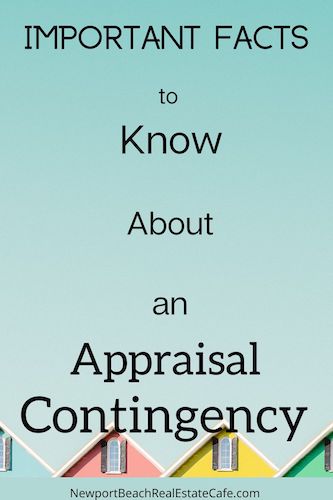An appraisal contingency is used when a buyer is obtaining a loan on the property. The contingency is a set price that the seller is willing to sell the property for, below which the buyers would not be approved for a loan.
When a buyer enters into an agreement to purchase a property with an appraisal contingency, they are agreeing to pay the set price in the purchase agreement. This contingency allows the buyer to protect themselves from overpaying on a property.
Appraisal Contingency: 8 Important Facts You Should KnowClick To TweetWhat is an Appraisal?
An appraisal is an evaluation of a property’s value. An appraiser will use numerous factors to come to their conclusions, such as the condition of the home, its amenities, and the current market value. An appraiser will factor in many items to determine the value of the property. An appraiser will compare the property to other similar recent sales and will factor in information such as square footage, number of bedrooms, size of the lot, and the location of the lot in a development. For example, a home that backs to a busy street may not have the same value as a home in a more desirable location.
There is also an appraisal contingency period that needs to be considered. The appraisal needs to be completed within the specified time that was agreed to on the purchase agreement.
Another factor that an appraiser considers is the view. If the buyer is searching for waterfront property and has an ocean view they will determine the type of view. A home located on a harbor may have more value than a home that is oceanfront. Views are subjective, however.
What is a Contingent Offer?
 A contingent offer is an offer to purchase a property that is contingent on the results of an appraisal. If the appraisal comes in at a lower value than the buyer agreed, they can either withdraw their offer or renegotiate the purchase agreement.
A contingent offer is an offer to purchase a property that is contingent on the results of an appraisal. If the appraisal comes in at a lower value than the buyer agreed, they can either withdraw their offer or renegotiate the purchase agreement.
There are other contingencies that can be included with the offer including a mortgage contingency, contingency of purchase (when the buyer needs to sell their home in order to purchase a new home), home inspection contingency, length of escrow, and the purchase price. Waiving a home inspection can be costly as a buyer may not be aware of any issues with the home.
All contingencies are negotiable. In this recent market, many buyers were waiting for the appraisal contingency to make their offer more competitive. However, if a buyer waived that contingency and the home did not appraise, then the buyer cannot utilize that as a reason to cancel the contract.
When to Use an Appraisal Contingency
There are a few situations in which you may want to use an appraisal contingency.
If you are purchasing a property with a loan, a home appraisal contingency can protect you from buying the property for more than it is worth. If you are not using a loan, an appraisal can protect you from overpaying for the property. You would technically utilize an appraisal contingency addendum to agreement of sale.
The most common situation in which an appraisal contingency is used is when purchasing a property with a loan. If the value of the property is below the set price in the purchase agreement, the buyers would not be approved for the loan. By having this contingency in place, the buyers are able to buy the property at a price they are comfortable with and still receive financing. If the appraisal falls below the set price, the buyer’s loan application may be denied.
What is an Appraisal Contingency Waiver?
Some people choose not to use an appraisal contingency because they do not think it will be necessary. If you believe that your offer will be accepted regardless of how much money is offered for the sale, there is no need for a contingency.
Buyers that are paying cash for a property may opt-out of including an appraisal contingency in the purchase agreement. If a buyer is paying cash for a property, they still have the right to make sure the property appraises at the value.
An appraisal contingency protects the buyers by ensuring that they can walk away from negotiations if they feel that they overpaid for the property.
What is an Appraisal Gap?
An appraisal gap is a difference between what the property is worth and what the buyers are offering. It is important to understand that an appraisal gap does not mean that the property is not worth the amount offered. It simply means that there is a discrepancy between what the property is worth and what the buyers want to pay. Many home buyers were offering to waive the contingency and cover the appraisal gap when they were in a bidding war.
important to understand that an appraisal gap does not mean that the property is not worth the amount offered. It simply means that there is a discrepancy between what the property is worth and what the buyers want to pay. Many home buyers were offering to waive the contingency and cover the appraisal gap when they were in a bidding war.
Often, this discrepancy can be resolved through negotiations. If negotiations do not resolve the issue, then the buyers can go ahead and walk away from the deal. When making an offer on a property in a competitive market, it is wise to consult with your agent about what contingencies you choose to include. Buyers can make home buying mistakes when making an offer including having too many contingencies that favor the buyer.
If you are using an appraisal contingency, it is important to understand how it works and its benefits. By understanding these key facts, you will be able to make an informed decision about whether or not to include one in your purchase agreement.
Risks of Waiving an Appraisal Contingency
If a buyer waives the appraisal contingency, they are essentially taking on the risk that the property is not worth what was agreed to in the purchase agreement. If the property ends up being worth less than what was offered, then the buyer could end up owing money to the seller.
If the property does not appraise, the buyer would have to cover the shortfall. The buyer needs to have the additional funds in place. If the appraisal is waived, then the buyer cannot use that reason to cancel the contract. There is a possibility that the buyer will lose their earnest money deposit.
Understanding how this type of contingency works can help you make an informed decision about whether or not to include one in your purchase agreement.
Appraisal Contingency: Important Facts You Should KnowClick To TweetAppraisal Contingency Versus a Mortgage Contingency
There are two types of finance contingencies when purchasing a home: appraisal contingency and mortgage contingency. Appraisal contingencies are agreements between buyers and sellers that stipulate that the property will not be delivered to the buyer unless it is appraised at a certain price. Mortgage contingencies are utilized when a buyer needs financing to purchase the property.
The main difference between appraisal contingencies and mortgage contingencies is that appraisal contingencies are agreements between buyers and sellers,
Mortgage lenders often require an appraisal to verify the value of a property before releasing funds for a loan. When you include an appraisal contingency in your purchase agreement, you are essentially waiving this requirement. If you do not have an appraisal contingency in your purchase agreement, the lender may require an appraisal before releasing funds for a loan.
If you decide to include an appraisal contingency in your purchase agreement, make sure that you understand all of the key facts about this type of agreement.
What If the Appraisal Comes in Low?
If the appraisal comes in lower than the price that you and the seller agreed to, there are a few options that  you have. The first option is to renegotiate the purchase price based on the new appraisal. If you are able to do this, then the sale will likely go through if all parties agree.
you have. The first option is to renegotiate the purchase price based on the new appraisal. If you are able to do this, then the sale will likely go through if all parties agree.
A buyer can challenge the appraisal or they can ask for a new appraisal. A second appraisal does cost money and this would be a buyer expense.
If the seller does not agree to lower their price, and the purchase agreement includes an appraisal contingency, then the buyer can utilize this contingency to cancel the agreement.
Overall, knowing what contingencies are available and understanding how they work can help reduce your risk when purchasing a property.
Final Thoughts
When purchasing a property, it is important to understand all of the risks and potential costs. By understanding appraisal contingencies, you can reduce your risk and maximize your chances of closing on a property that is worth your investment.
About the Author
The article “Appraisal Contingency: 8 Important Facts You Should Know” was written by Sharon Paxson, a top Newport Beach Real Estate Agent. With experience beginning in 2005, representing buyers, sellers, and landlords, we welcome the opportunity to share our expertise with you and guide you through your real estate transaction.
